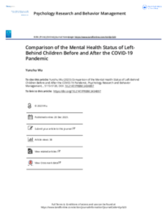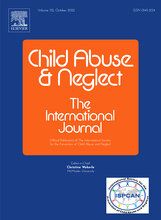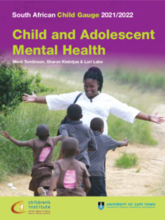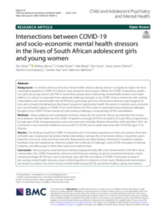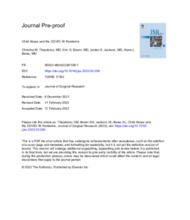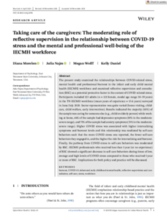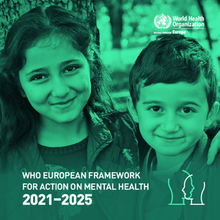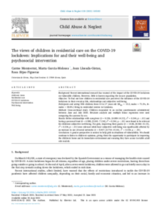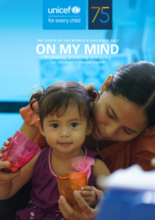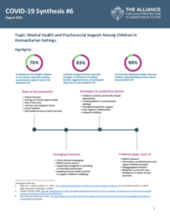This section includes resources and tools for mental health and psychosocial support during the COVID-19 pandemic.
Displaying 1 - 10 of 65
To investigate and discuss the mental health status of left-behind children in Anhui Province before and after the COVID-19 pandemic and analyze its influencing factors.
This U.S.-based study details the prevalence of youth at the intersection of parental incarceration and foster care, their demographic characteristics, and heterogeneity in their mental health.
This sixteenth issue of the South African Child Gauge focuses attention on child and adolescent mental health and how early experiences of adversity ripple out across the life course and generations at great cost to individuals and society. It calls on South African society to put children at the centre of all policies in order to protect children from harm, build their capacity to cope with stress and adversity, and provide them with opportunities to thrive.
The purpose of this study was to examine socio-economic and mental health impacts of COVID-19 on South African adolescent girls and young women (AGYW) in order to understand how additional challenges brought on by COVID-19 have intersected with existing challenges, compounding AGYW vulnerabilities.
The COVID-19 pandemic had widespread effects, including enhanced psychosocial stressors and stay-at-home orders which may be associated with higher rates of child abuse. The researchers aimed to evaluate rates of child abuse, neglect, and inadequate supervision during the COVID-19 pandemic.
his study examined the relationships between COVID-related stress, mental health and professional burnout in the infant and early child mental health (IECMH) workforce and examined reflective supervision and consultation (RSC) as a potential protective factor in the context of COVID-related stress.
The WHO European Framework for Action on Mental Health (EFAMH), covering the period 2021–2025, sets out a response to current mental health challenges arising from the negative impact that the COVID-19 pandemic has had on population mental health and well-being. The EFAMH provides a coherent basis for intensified efforts to mainstream, promote and safeguard mental well-being as an integral element of COVID-19 response and recovery; to counter the stigma and discrimination associated with mental health conditions; and to advocate for and promote investment in accessible quality mental health services. Implementation and monitoring of this Framework for Action will be powered by the Pan-European Mental Health Coalition, a flagship initiative of the European Programme of Work 2020–2025. Draft of this document was tabled as a background document for the discussion on mental health during the 71st session of the Regional Committee for Europe, Virtual session, 13–15 September 2021.
Recent international research has warned of the impact of the COVID-19 lockdown on vulnerable children. However, little is known regarding the in-care population. The objective of this study was to find out how children in residential care perceived the influence of the COVID-19 lockdown in their everyday life, relationships and subjective well-being. Participants and setting: 856 children from 10 to 17 years old (Mage = 15.5, males = 71.2%, females = 28.8%) living in residential centres in Catalonia.
The State of the World’s Children 2021 calls for commitment, communication and action to promote good mental health for every child, protect vulnerable children and care for children facing the greatest challenges.
The purpose of this evidence synthesis is to summarize what is already known about the impacts of the pandemic on children’s mental health risks, specifically in humanitarian settings with the aim of providing an overview of evidence to date. This synthesis captures the toll that COVID-19 and public health measures to reduce its transmission have taken on children’s mental health worldwide due to stressors from social isolation, family hardships, school closures, service interruptions, and economic crises. Evidence relevant to mental health and psychosocial support generally and in conflict-affected settings were included. Together, 52 academic articles and resources and 21 news articles from April 2020 to July 2021 were compiled for this report.

